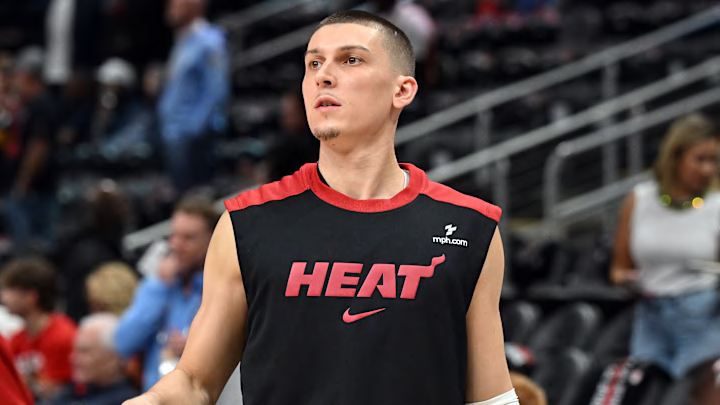Leverage is critically important in any negotiations—NBA extension talks included. When players aren't the kind of load-bearing mega-talents worthy of a blank check, franchises must carefully monitor the money involved and guard themselves against getting overexposed.
That's why so much has already been written about the Miami Heat's need to exercise caution in extension talks with Tyler Herro. That was, of course, easier said than done when the 25-year-old was one of their only hopes for competence on the offensive end.
That's what made the Norman Powell pickup so vital. Beyond being one of the obvious steals of the offseason, he is a viable scoring threat from the off-guard slot, meaning Miami no longer has to think of the position in Herro-or-bust terms.
The Heat can't afford to overpay Herro, and with Powell around, they shouldn't.
Miami has carefully guarded its future cap space in a way that allows the organization to entertain the biggest ambitions for its future. If the Heat preserved that flexibility, they could have upwards of $90 million in cap space by the 2027 offseason, when a horde of household names like three-time MVP Nikola Jokić and longtime Heat target Giannis Antetokounmpo can enter free agency.
In other words, any dollar spent now could have major ramifications down the line. And if the Heat extend Herro this offseason, plenty of dollars will be spent.
Come October 1, he'll be eligible to sign a three-year extension worth up to $149.7 million. You can rest assured he'll seek out something very close to that number, if not the full pay rate himself. He is 25 years old and looked objectively awesome last season, booking his first All-Star spot while averaging 23.9 points on 47.2/37.5/87.8 shooting and 5.5 assists against 2.6 turnovers.
The Heat should want to keep him around. Even after a rough showing in the playoffs, his trajectory is pointing all the way up.
They just shouldn't feel as if this is a name-your-price kind of thing. They need to show some restraint, or they'll dash their long-term dreams before they ever had a chance to be realized.
Powell's presence provides that kind of leverage. Miami shouldn't feel as if it has to pay Herro whatever he wants, because perhaps Powell, who is also extension-eligible this offseason, could stick around for a lot less money. Score-first guards are struggling to get paid in the NBA, and maybe that convinces Powell, who turned 32 in May, to accept a salary in the $15 million-to-$20 million range.
Powell isn't the same caliber of player Herro is—the latter boasts significantly more shot-creation and playmaking—but Powell is a solid starter who quietly had an All-Star case last season. He is someone Miami could feel reasonably confident about keeping around, and hopefully that plays a part in extension talks with Herro.
Even if the Heat want to keep Herro—and again, they definitely should—they shouldn't feel compelled to give him exactly what he wants. Powell gives them some leverage, and their ability to use that in extension talks with Herro could play a major part in them finding a new face of the franchise down the line or not.
